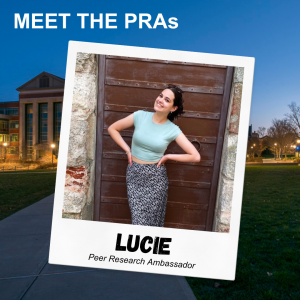Meet Lucie Lopez ’24, an OUR Peer Research Ambassador (PRA) double majoring in Psychological Sciences and Spanish.
 What is the focus of your research?
What is the focus of your research?
I am currently working on an IDEA Grant project that combines two of my research interests I had previously explored separately: social-emotional development and food insecurity. My research explores how participation in a free or reduced school meal program impacts sense of belonging at school, particularly for adolescents.
Why did you get involved in research?
Before coming to UConn, I didn’t have much of an understanding of what research really was and what the process entailed. I knew UConn was a Research I institution and had read about so many cool student-led research projects in the UConn Today magazine and always wondered how I could do something like that. I wanted to explore more of what research as an undergraduate could look like, so I joined a lab during my second semester. That experience in my lab and the SHARE summer apprenticeship taught me what the research process was like and made me realize that I really enjoyed it. After those experiences, I wanted to investigate my own ideas, so I applied for the IDEA Grant Program. I am currently working on an IDEA Grant project that combines two of my research interests I had previously explored separately: social-emotional development and food insecurity. My research explores how participation in a free or reduced school meal program impacts sense of belonging at school, particularly for adolescents.
What advice would you give to aspiring student researchers?
First, I would let aspiring student researchers know that they don’t have to have it all figured out and, with that, to keep an open mind. It is very rare to find a student who knows what kind of research they will love doing before they do it. You might expect to enjoy research in a particular subject, but after working in a lab, you might not enjoy it as much as you thought. On the flip side, you might find yourself pursuing research in an area you didn’t expect to like as much. Be open-minded when researching different subject areas with diverse faculty; you might surprise yourself.
Another piece of advice I would give to an aspiring student researcher is to go with the flow. It sounds simple, but often in research, not everything goes according to plan, and that’s ok. Adapting and thinking outside the box when a problem arises is more important than forcing yourself to stick to your original plan when it’s no longer the best option.
What do you enjoy the most about participating in research?
My favorite part of participating in research is seeing everything come together. Starting my own research project was initially daunting, especially as an undergraduate with only a few semesters of experience. However, as I slowly started checking items off my to-do list, I began to see everything come together and realized that I was capable of much more than I thought. I love the process of doing the small tasks that lead up to the bigger ones, seeing how everything impacts one another, and slowly seeing the whole picture come together. It’s like doing a puzzle, making all the smaller sections, finally putting them together, and seeing how they all fit.
What are your plans after graduation? How has involvement in research influenced your plans?
After graduating, I plan to attend graduate school to receive my Ph.D. in School Psychology. I’ve been interested in school psychology since my first year at UConn but was unsure how the research would fit into my role as a practicing school psychologist working in the school system. However, I soon realized that pursuing a Ph.D. would allow me to gain the tools necessary to be a practicing school psychologist and researcher. In graduate school, I will most likely be taking a lead role in many projects, but doing my own research project as an undergraduate student will make those lead roles seem less intimidating. My research experiences at UConn have given me tools and knowledge that I will take into graduate school and beyond.
Click here for more information on Lucie and other OUR Peer Research Ambassadors.